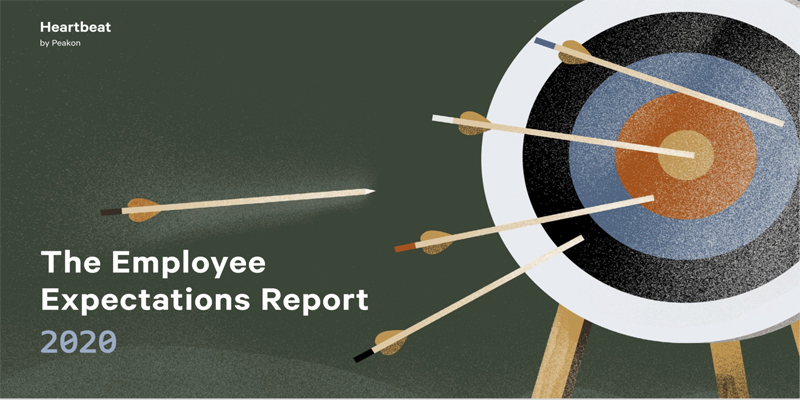Diversity and inclusion (D&I), wellbeing, flexible work and climate change are the top four topics that staff worldwide are concerned about, according to employee platform Peakon. Its inaugural 2020 Employee Expectations Report, which analysed more than 14 million staff survey comments, saw a sharp increase in concerns particularly around the aforementioned topics.
As well as highlighting employee concerns, the report reveals that 59% of the global workforce are disengaged, and want companies to do more in the areas of D&I, wellbeing, flexible work and climate change.
ENVIRONMENTAL CONCERNS
Employee concerns about the environmental impact increased by 52% globally, according to the Peakon study. Workplace environment dicussions grew 128% among Generation Z, followed by Millennials (62%) and Baby Boomers (59%). Both Australia and New Zealand saw a whopping 220% hike in discussions about climate action between 2018 and 2019. This spike was more than double the growth seen in the UK (85% increase), and almost five times that of Germany. However, staff in Germany still commented the most on climate change overall, revealed the report.
Plastic, single-use and carbon footprint were among the most prevalent topics related to the environment that employees discussed. In fact, 2019 also marked the first time that Greta Thunberg was mentioned in staff survey responses. Employees in the manufacturing sector were the most vocal on climate change in the past year, with a huge increase of 595% in environment-related terms year-on-year, followed by the consumer industry (up 106%) and professional services sector (up 79%). The spike in environment-related comments among manufacturing employees meant it went from being one of the least vocal sectors on the topic in 2018, to one of the highest in 2019.
D&I CONCERNS
Peakon’s report also highlighted a 19% increase in D&I-related concerns. Although all generations are increasingly concern about D&I, the Silent Generation, in particular, experienced the highest increase at 31%. This was more than the Millennial cohort (22%), and more than double the Gen Z group (15%). The Silent Generation is nearing retirement age, and as younger employees make up the majority of the current workforce, this group is becoming increasingly aware of their older years and the bias this may bring. In fact, the Silent Generation cited age, being bullied and discrimination as their top concerns. This highlights the fact that this group does not feel that their needs and expectations are being met at work — and that employers need to cultivate inclusive working cultures for all generations, noted the report.
Mentions of D&I grew by 43% in the education sector, followed by the consumer industry (29%) and manufacturing (26%). Employees in Denmark are the most vocal about D&I overall, followed by New Zealand and Ireland. This topic rose in prevalence in New Zealand over the past year by 44%. The report noted that terms such as ‘POC’ (people of colour), ‘race’ and ‘minority’ are rising in prevalence amongst staff.

WELLBEING ISSUES
Over the past year, employee concerns around wellbeing-related topics have also increased by 17%, year on year. The report suggests that younger generations are more health-conscious than their older peers, and are (at least in part), responsible for bringing wellbeing into the workplace.
While all generations demonstrated growing concerns regarding workplace wellbeing, Gen Z employees is the most vocal on the topic (28%). This year-on-year increase is twice that of Generation X at 13%, and more than four times that of the Baby Boomer group, which saw a more modest increase of 6%. Their older peers, the Millennials, share Gen Z’s interest in health and wellness at work with a 22% increase in workplace discussions. The Silent Generation cohort also saw a 19% increase in wellbeing discussions, proving that health is not just a concern for the young.
Wellbeing concerns increased by 51% in the finance sector, followed by government (40%) and the consumer sector (35%). Employee comments on wellbeing jumped by 37% in New Zealand, followed by the UK (21%) and Australia (9%).
FLEXIBLE & REMOTE WORKING
Staff concerns around flexible and remote working have also increased by 18%, globally. Younger workers have grown increasingly vocal about flexible and remote work, particularly Generation Z employees who saw a 36% increase in discussions on flexible working. Millennials weren’t far behind (34%), compared to 16% of Generation X, 11% Boomers and 11% of the Silent Generation.
Discussions about flexible/remote work increased the most in the transportation industry by 52%, followed by the consumer sector (51%) and government (16%). Employees in the UK, Germany and the US appear to be the most vocal about flexible working, according to the report.
SPIRALLING EXPECTATIONS
Commenting on the findings of the report, Peakon’s CEO and Co-founder, Phil Chambers, stated: “As employees, we often think about what companies expect from us. But we also need to be clear about what we expect from our employers. Amid spiralling employee expectations, it is vital that organisations listen to employee feedback on a regular basis. Only then can they understand and meet their teams’ expectations, before employees look for new opportunities elsewhere.”

These shifts in employee expectations are being felt across all generations, industries and regions, with employees no longer feeling that they have to leave their personal lives at the office door, according to the research. Businesses that don’t keep pace with these evolving trends will fail to connect with their most critical audience – their current and future employees. Eventually, they will risk losing the people that define their culture, build their product, and ultimately drive their business success, the report noted.
For more information about the report, click here.








































